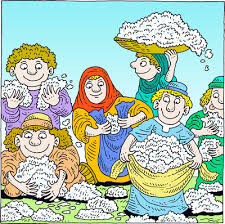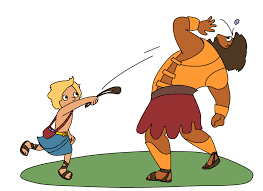Joshua 11:10-11 – And Joshua turned back at that time and captured Hazor and struck its king with the sword, for Hazor formerly was the head of all those kingdoms. And they struck with the sword all who were in it, devoting them to destruction; there was none left that breathed. And he burned Hazor with fire.

Here we have the final outcome of those who participated in the war against Israel. As we would expect, their ends were exactly the same as those of the southern alliance – they were defeated and destroyed. The outcome at Hazor is particularly recorded because of its role as the organizer of the confederacy.
Jabin, king of Hazor, was the commander-in-chief. He had apparently escaped the battle with his life and immediately retreated to what he thought was the safety of his walled city. He must have felt particularly relieved when Israel left the area to pursue the troops to Sidon and Mizpah.
But his hope was built on the shifting sand. His city was not an oasis of safety but a trap of death; it was subdued by Israel and burned to the ground. He and all his remaining subjects were slain.
On a side note, it is worth noting that this was not the end of Hazor. Other Canaanites eventually rebuilt it and settled there, establishing the same city and government. Hazor once again caused Israel trouble during the era of the judges (Judges 4:2). Interestingly, we find that during this later period they were still coming against Israel with cavalry and chariots.
Joshua 11:12-14 – And all the cities of those kings, and all their kings, Joshua captured, and struck them with the edge of the sword, devoting them to destruction, just as Moses the servant of the Lord had commanded. But none of the cities that stood on the mounds did Israel burn, except Hazor alone; that Joshua burned. And all the spoil of these cities and the livestock, the people of Israel took for their plunder. But every person they struck with the edge of the sword until they had destroyed them, and they did not leave any who breathed.
Every single kingdom that fought against Israel was defeated - no exceptions. And every single person in those kingdoms received a sentence of death so that their worship of false gods and demonic powers would not corrupt the people of Israel (Deuteronomy 20:16-18). The only kingdom to be spared was Gibeon, who became laborers in the service of the temple.

However, not every city was burned as Hazor was.
Before Israel had even entered the Promised Land, God declared that he would give them the houses, food and possessions of their enemies:
Deuteronomy 6:10-11 - And it shall be, when the LORD your God shall have brought you into the land which he swore unto your fathers, to Abraham, to Isaac, and to Jacob, to give you great and beautiful cities, which you built not, and houses full of all good things, which you filled not, and wells dug, which you dug not, vineyards and olive trees, which you planted not...
It made no sense for Israel to completely destroy and/or burn these resources/blessings. Instead, they were enriched by the spoils of their enemies. The people of Israel possessed their homes, drew water from their wells, ate their crops and inherited their livestock.
These blessings allowed them to start a new and prosperous life in the land that flowed with milk and honey! This is an example of the wealth of the wicked being transferred to the just (Proverbs 13:22).
Joshua 11:15-16 – Just as the Lord commanded Moses his servant, so Moses commanded Joshua, and so Joshua did. He left nothing undone of all that the Lord had commanded Moses. So Joshua took all that land, the hill country and all the Negeb and all the land of Goshen and the lowland and the Arabah and the hill country of Israel and its lowland.
This verse gives a general description of the land taken under the leadership of Joshua. Notice that it is a description, not a list of assets. Obviously, every single kingdom that was subdued by Israel is not mentioned here. The overall point is that God (and Joshua) continued in the work of the conquest, uninterrupted, until it was finished.
This is a very comforting thought. We can be sure that God will faithfully continue his work in our generation too, because he never changes (Malachi 3:6). This means that when he begins to subdue evil in our government, he will not stop until every foe of the church is vanquished. When he begins to subdue evil in our school systems and universities, he will not stop until every foe of the church is vanquished. When he begins to subdue evil forces that cloud the minds/hearts of sinners preventing them from accepting the gospel, he will not stop until every foe of the church is vanquished. Hallelujah!
However, before we start a victory dance, let's remind ourselves that we (like Joshua) must continue to partner with God in this important work. We must faithfully and continuously work to elect godly men and women into government positions. We must support righteous people to serve on our school boards and act as trustees of colleges and trade schools. We must continue to do everything within our power to spread the gospel of Jesus Christ to every nation across the globe.
Here is some good news to keep in mind as you continue in the daily fight: Although the battle may seem to last a long time, we have the assurance that we will be victorious, if we don't give up.
Galatians 6:9 – And let us not be weary in well doing: for in due season we shall reap, if we faint not.
God is not going to single-handedly transform our culture and our nation without including us in the process.
However, if we agree to partner with him, we can be sure he will both start and complete a good work in our midst. We can expect victory over darkness; we can be sure that the great revival which we hope for will become a reality.
Joshua 11:17-18 - from Mount Halak, which rises toward Seir, as far as Baal-gad in the Valley of Lebanon below Mount Hermon. And he captured all their kings and struck them and put them to death. Joshua made war a long time with all those kings.
We are not going to go into detail on the location of the places listed in verses 16-17. Suffice to say, the scripture is telling us that God granted Joshua and the Israelite army control of the Promised Land.

But it didn't happen overnight. Once Israel crossed the Jordan, they conquered Jericho, Ai and the five-nation southern alliance very quickly. However, the overall conquest of the land took 'a long time'. What does that mean? Based on comments made by Caleb after the defeat of the confederacy, many scholars believe it took five years to finish the conquest (Joshua 14:10). Others, however, believe it took as long as seven years.
One thing is clear - after the war with the southern alliance, God significantly slowed the pace at which Israel conquered other kingdoms. Why would he do that? Why didn't God give his people complete victory in about 18-24 months?
- For one thing, drawing out the conquest gave the remaining Canaanites time to repent. They heard about the God of Israel and they had seen evidence of his mercy towards the Gibeonites. If they had desired to do so, they too could have surrendered to Israel, which would have saved their lives and given them a chance to serve the Lord.
- Kingdoms that were not under attack or siege by Israel carried out their normal routines. This was especially important with regards to farming. The Canaanites would plant crops, and as Israel took the land little by little, there were always supplies readily at hand. We could say that the Canaanites essentially planted and harvested provisions for the continued support of the Israeli army. If Israel had conquered all of the kingdoms in about a year, they would have been left with no provisions and no time to plant crops. Famine would have ensued.
- The Lord told Israel long before they stepped foot into the Jordan that they would only take the land a little at a time because otherwise wild animals would multiply and destroy the land:
Deuteronomy 7:22 - And the LORD your God will drive out those nations before you little by little: you may not consume them at once, lest the wild animals of the field become too numerous for you.
- God also caused the conquest to be drawn out to give Israel 'skin in the game'. In other words, people who obtain something without a sacrifice or investment on their part have little value for the thing they obtained. If God had miraculously given them the entire land quickly, they might not have valued their inheritance as much. But since they had blood, sweat and tears invested in the conquest, the land was very important to them.
- The drawn out warfare sharpened the military skills of Israel, which were necessary for them to hold the land.
- The protracted period of time also provided an opportunity for God to show/teach his people how to be persistent. They needed to learn the art of resting and trusting in him over time, because not every battle passes quickly. This period of warfare exercised the patience, courage and perseverance of Israel as well as her faith in God.
Joshua 11:19-20 – There was not a city that made peace with the people of Israel except the Hivites, the inhabitants of Gibeon. They took them all in battle. For it was the Lord's doing to harden their hearts that they should come against Israel in battle, in order that they should be devoted to destruction and should receive no mercy but be destroyed, just as the Lord commanded Moses.
At first glance, these verses seem difficult to understand. The concept of the Lord hardening a heart so that it should be destroyed, is foreign to what we know about him:
Psalms 103:8 – The Lord is merciful and gracious, slow to anger, and abundant in mercy.
How then, are we to understand this situation? What does it mean when the Lord 'hardens' a heart?
There is an analogy that effectively describes the hardening this way: God is like the rays of the sun shining down on the world. When the sun strikes wax, the wax softens and becomes pliant. When the sun strikes clay, the clay is hardened and becomes brittle. It is the same sun, but we get different results based on the makeup of the item the sun touches.
So it is with the hearts of men. God's mercy shines down on all. Some will surrender to him (like Rahab) and become pliant. They will repent and turn towards God. Others (like the kings of Canaan) will harden their hearts and become brittle, refusing to repent. By rejecting God, they seal their own destruction.
For example, we read in the scriptures that God hardened the heart of Pharaoh, king of Egypt, who then refused to allow Israel to go free (Exodus 7:13, 9:12, 14:17). There can be no doubt that Pharaoh knew about Jehovah. Moses had spoken of him and Pharaoh himself had seen numerous proofs of his existence and power.

Consequently, Pharaoh had a choice to make – would he humble himself and surrender to the mercy of Jehovah, or haughtily continue to serve the false gods of Egypt? One path led to life, the other to death.
Here is something else to consider: God could very easily have used any means at his disposal to frighten or intimidate Pharaoh into choosing him. Doing so would not have been a problem for God at all! But God did not do that. Instead, he stepped back and allowed Pharaoh to make his own choice.
As we know, Pharaoh chose to stick with false gods, who fed his inner desires of pride, control, greed and general perverseness. Although he initially decided to let Israel go free (to give himself relief from the plagues), he changed his mind and pursued Israel with all the military might he possessed. Once the Egyptians came against Israel in war, God stepped in and destroyed them.
Thus, we can conclude the following:
- Pharaoh had knowledge of the true God.
- He had physical evidence which backed up that truth.
- He had a fair chance to make his own choice.
- He chose to reject God's mercy and thus his heart was hardened when touched by the light of God.
- Because of his choice, he attempted to destroy Israel and thus he sealed his own fate.
The 'hardening' of the Canaanites was very similar; the conquest of Canaan was never a massacre of innocent, non-resisting inhabitants.
The people of that land had been given a measure of spiritual insight. For instance, we are expressly told that Rahab (the woman of Jericho who assisted the spies) knew all about God and the wonders he performed on behalf of Israel (Joshua 2:9-11). According to her own testimony, so did everyone in Jericho. In fact, so did every kingdom in Canaan.

The inhabitants of Canaan had both seen and heard of the miracles the Lord had performed. These included Israel's freedom from Egypt, crossing the Red sea on dry land, the manna in the wilderness, the defeat of Sihon and Og, the crossing of the flooded Jordan River and the battle at Jericho.
At that point, all of the kings of Canaan had a choice to make. It was the same choice Pharaoh faced. They could choose to turn to Jehovah or keep serving their false idols. God stepped back and allowed them to make their choice.
All of them chose to resist God and as a result all of them were hardened by the light of God. All of them chose to aggressively attack Israel and try to destroy her. Once they did, they sealed their own fate because Israel had every right to fight back when attacked.
I cannot help but wonder if we are not seeing a similar scenario play out on the world's stage today. At the writing of this post, terrorist groups have broken a peaceful situation by attacking the Israelites in Gaza. Now Israel has the right to fight back.
Joshua 11:21-22 – And Joshua came at that time and cut off the Anakim from the hill country, from Hebron, from Debir, from Anab, and from all the hill country of Judah, and from all the hill country of Israel. Joshua devoted them to destruction with their cities. There was none of the Anakim left in the land of the people of Israel. Only in Gaza, in Gath, and in Ashdod did some remain.
The Anakim or the sons of Anak, were a fierce race of giants which lived in various places in Canaan. They are specifically mentioned here because they were one of the main excuses given by the men of Israel for not entering the Promised Land. This happened during Israel's first opportunity to take the land under the leadership of Moses (Numbers 13:22, 31-33).
Because the giants terrified the men of Israel so much, it was important that they be defeated so they didn't hinder the continued progress of Israel.
Think of it this way: If the Anakim remained in the land, they would always be a source of fear and terror to Israel. Whenever Israel saw them, they would be filled with anxiety and fear, thinking that their most difficult battles were still in the future. Their presence would obscure the glory of God and undermine the faith of Israel. Therefore, they had to be defeated sooner rather than later.
During this 5-7 year period, Joshua and his army put to death all the giants they could find. However, they were not completely destroyed. Some fled to the Philistine cities of Gaza, Gath and Ashdod which were located close to the coast of the Mediterranean Sea.

The Anakim continued to be an enemy of Israel for many years to come. You have no doubt heard of one of the more famous sons of Anak – Goliath of Gath, who was slain by king David.
Joshua 11:23 – So Joshua took the whole land, according to all that the Lord had spoken to Moses. And Joshua gave it for an inheritance to Israel according to their tribal allotments. And the land had rest from war.
It's important that we understand what this verse says and what it doesn't say.
It tells us that Israel, under the command of Joshua, had overcome all overt resistance. All the kings and kingdoms that had declared war on Israel had been defeated. Israel had possession of many cities and towns which were a sufficient habitation for the people at that time.

It does not say that every single city or district within the Promised Land had been subdued and purged of Canaanites. Indeed, it would have been unwise to conquer more territory until the Israelites were peaceably settled in the land they already controlled.
Nevertheless, enough progress had been made so that Joshua could now divide the land up among the twelve tribes. Once this was done, it would then be up to each tribe to subdue the Canaanites who lingered in their share of the inheritance.
As we mentioned previously, this plan allowed the land to be continuously cultivated and it kept the wild animals for overrunning the territory. By allowing the Israelites to settle into communities, it also gave the families peace and rest. Once they were ready, they could go back out to war and subdue more of their inheritance.
As for their part, the Canaanites offered no further organized resistance to the division of the land among the Israelite tribes; they seemed to be content to stay in their remaining cities. This period of peace provided the opportunity to rest and to divide up the land.
When we study this account of the Promise Land, we are reminded that Joshua was a type of Christ. He led Israel in battle until the people rested from war. Similarly, Jesus is the commander-in-chief of God's army. He is, and will continue, to lead the church in conquering the world for his kingdom until the time when God calls us home to heaven, where we will have eternal rest (Hebrews 4:8-10).
Just as Israel's battles ended in victory, so will ours:
Victory has been promised to the people of God all through the scriptures. It began in the book of Genesis where God declared that the seed of the woman would bruise the head of the serpent (Genesis 3:15), and it continues until God calls us home to a new heaven and earth in the book of Revelation.
Our victory is secured by God's help. As we studied Joshua chapters 1-11, it was evident that as Israel conquered the Promised Land, God was aiding his people every step of the way. In the same way, we are victorious in spiritual warfare because God is fighting for us (Psalms 118:6), because he is giving us strength to fight (Psalms 117:1) and because Christ has already conquered our enemies:
1 Corinthians 15:57 - But thanks be to God, who gives us the victory through our Lord Jesus Christ.
Victory is obtained through battle. Just as Joshua and the Israelites had to fight to obtain the promises of God, we too must stand and fight against the principalities and powers of this age (I John 5:4, Ephesians 6:10-11), claiming God's promises and taking the kingdom of God by force (Matthew 11:12).
Let me offer you some encouragement:
The Anakim or the race of giants, are mentioned in today's post. Fear of these giants was one of the main reasons Israel refused to step into the Promised Land on their first opportunity. As a result of their rebellion against God, Israel was forced to wander in the desert for 40 years.
Let's examine that a bit more closely. The claims of the 10 spies were accurate – the giants were very big, very fierce, very strong and very experienced. They represented a very real threat/challenge.
The ten spies' mistake was not incorrectly assessing their enemy – it was in surrendering their hearts/minds to fear. The minute fear rose up within them, they should have fought it off with faith. Instead of fearing what might be true or what might happen, they should have reminded themselves of what they knew to be true and what they knew was going to occur:
- They were God's chosen people.
- God had promised to give them the land.
- God had proved his faithfulness by protecting them in the 40-year wandering and bringing them to the threshold of the Promised Land.
- God had promised never to leave them; he had instructed them to be strong and of good courage.
But instead of keeping their minds focused on these promises of God, they allowed fear to take over and rob them of their blessing.
Stop and meditate on that for a minute: Israel lost the battle in their mind first - long before they were defeated in the physical realm. We can conclude that the way we think has a lot to do with our victory or defeat.

Ask yourself this question: What are you filling your mind with?
The truth of the scriptures? Praise and worship songs? Testimonies of those who have overcome? Things that are good and perfect (Philippians 4:8)? Or with worldly thoughts, melodies and stories that have no lasting value?
I strongly encourage you to examine and gain control over the thoughts of your own mind.
Let me offer you some relief:
The church of Jesus Christ is facing some formidable opposition. There are demonic forces that want to destroy our nation, our families and our children. Their power and strength are very real.
The good news is that when Jesus fights on our side, we cannot be defeated! However, we cannot just sit by and do nothing. We must partner with God through prayer, confession of his word and practical action. When we engage the enemy in this fashion, God is sure to give us the victory, just as he did for Israel!
This also applies to our personal lives. What 'giant' are you facing today? Your foe may be powerful. It may have been deeply entrenched in your situation for many years. But it is not invincible! It must bow to the name of Jesus Christ:
Philippians 2:10 - That at the name of Jesus every knee should bow, of things in heaven, and things in earth, and things under the earth;
Remember – giants can be defeated if you follow God's commands and stay in faith!
Let me offer you some strength:
Scripture tells us that there is a time for everything under the sun (Ecclesiastes). Israel had seasons of war and seasons of peace. They had seasons of 'enough' and seasons of prosperity. They had seasons of intense labor and seasons of bountiful rest.
The same is true in our lives. For example, when we are younger, we have seasons of intense labor when we work, marry and raise children. But this gives way to seasons when we are established in our careers, the children are grown, and we have more free time. Some people are in a season where they must care for their parents or grandchildren. Others are in a season of learning or training. Some of us may find ourselves in a season of transition.
Regardless of what season you are now experiencing, know that God is with you. He will never leave you, or forsake you. He will never let you down. He will give you rest, peace and strength, as he takes you safely from one season of life to the next.
